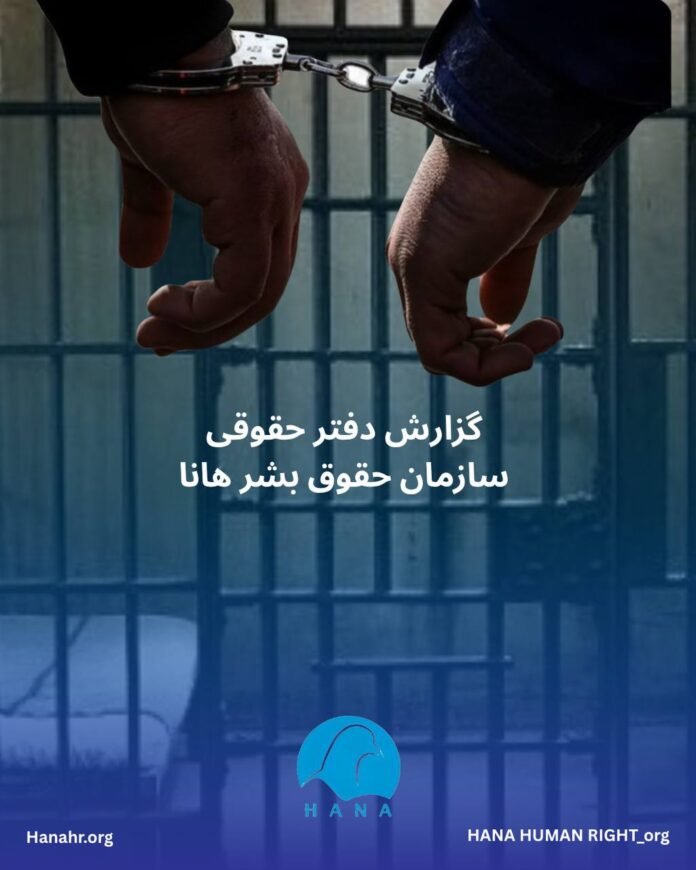According to information gathered by Hana, following the ceasefire agreement in the 12-day war between Iran and Israel, the security agencies of the Islamic Republic of Iran have launched a new wave of arbitrary arrests and enforced disappearances in Kurdish cities under the pretext of “security clearance” and “searching for spies.”
Based on Hana’s investigations, between June 18 and July 19, 2025, dozens of Kurdish citizens were arbitrarily arrested and forcibly disappeared by security forces in various cities across Kurdistan—particularly in Sanandaj, Mahabad, Sardasht, Marivan, Saqqez, Baneh, Bukan, Kamyaran, and Divandareh.
Hana’s field data indicates that in most cases, security officers carried out the abductions using unmarked vehicles and civilian clothing, often with excessive use of force.
Even under the minimal legal standards of the Islamic Republic, an arrest must meet specific legal conditions. Any detention carried out outside these conditions is considered unlawful. According to Iran’s Code of Criminal Procedure, in such cases, the local prosecutor is responsible for responding to the families and must issue the necessary orders to security agencies and provide a clear legal status regarding the disappeared individuals. However, over the years, such abductions have become a common practice among security forces in Kurdistan, and families—despite repeated efforts to contact prosecutors—have not been able to obtain timely information about the fate of their loved ones.
According to the International Covenant on Civil and Political Rights (ICCPR), to which Iran is a party and which is considered part of domestic law, arbitrary and unlawful arrests are prohibited. Furthermore, Article 2 of the International Convention for the Protection of All Persons from Enforced Disappearance defines such acts by security officials as enforced disappearance and a criminal offense.
To avoid international accountability for the systematic practice of enforced disappearances, the Islamic Republic has refused to ratify the Convention. Nonetheless, Iran remains one of the countries with the highest number of open cases submitted to the UN Working Group on Enforced or Involuntary Disappearances—an independent body established by UN General Assembly resolutions to investigate such cases globally. It is worth noting that the registered cases represent only a small fraction of the actual incidents in Iran, as many families are unable to file complaints due to various obstacles or refrain from pursuing justice under extreme pressure and threats.
Hana Human Rights Organization expresses deep concern over the excessive powers of security agencies in Kurdish cities and the new wave of abductions and enforced detentions, particularly after the ceasefire. Hana urges international organizations to pay special attention to this situation and calls for independent inspections of secret detention facilities by UN human rights rapporteurs or joint committees from the Red Cross and Médecins Sans Frontières (Doctors Without Borders).
List of Individuals Arbitrarily Arrested or Forcibly Disappeared by Security Forces During This Period:
Mahabad – 24 individuals: Rebin Mostafazadeh, Arash Mollaahmad, Younes Tanhaei, Soroush Yousefzadeh, Mehran Khediripour, Pouria Nasiri, Nour-e din Dudkanlou Milan, Keyvan Mamegoli, Keyvan Ashtab, Khaled Bakri, Mohammad Bakri, Shaho Mohammadi, Soran Safari, Omid Rash, Asaad Rasoulzadeh, Naser Elyasi, Saadon Ghazali, Rahman Mam Esmail, Kambiz Mohammadi, Chalak Mohammadi, Seyed Kamal Ebrahimi, Mansour Rahimi, Kamran Ravaz, Salah Bahamin.
Bukan – 19 individuals: Ali Mohammadi, Behrouz Yazdanpanah, Esmail Esmailpour, Diako Yazdanpanah, Behrouz Sharifian, Karim Ghaderpour, Ayoub Khosrouzadeh, Anwar Bayzidi, Anwar Ebrahimzadeh, Awat Alipour, Smko Maroufi, Hejar Abdollapour, Esmail Saniar, Sadegh Zand, Malek Farajbeigi, Shwane Shirbeigi, Ferya Chavoshini, Sabah Aminian, Esmail Choukli.
Marivan – 9 individuals: Ayoub Darbarzin, Hamzeh Osmani, Ahsan Osmani, Abdollah Bakhe, Omid Bakhe, Ramyar Rezaei, Faieq Bastan, Heman Ranjbar, Heman Bastan.
Naqadeh – 7 individuals: Amin Bashouki, Rahman Khalkhali, Farhad Karimi, Kaveh Ghaderi, Saman Kakemami, Salam Seyed Mahmoudian, Sirwan Azizi.
Piranshahr – 9 individuals: Azian Mashaiekhi, Sadegh Mahmoudnejad, Seyed Rahman Hosseini, Ahmad Mam Sharifi, Hassan Falaeian, Aziz Khezri, Zanyar Khezri, Hamed Shahi, Zubair Mahmoudi.
Saqqez – 6 individuals: Milad Rahimi, Hadi Rahimi, Zahed Hejri, Omid Abdikhah, Ata Golnari, Asaad Sedighi.
Oshnavieh – 11 individuals: Khaled Bayzidi, Edris Rasouli, Kamran Rasouli, Mamosta Omar Mohammadi, Abdolsalam Ghader Galvan, Kamyar Oghabi, Hassan Shadab, Mansour Farash, Mahmoud Ghaderi, Kaveh Khakinahad, Jamal Hosseinnezhad.
Divandareh – 2 individuals: Abdol Rasouli, Fouad Moradi.
Orumiyeh – 5 individuals: Alireza Khaledi, Afshin Azizi, Kaku Azizi, Ayhan Ebrahimi, Vahab Alizadeh.
Sanandaj – 9 individuals: Jalal Khodamoradi, Naseh Mostafaei, Diako Miri, Ghane Khatari, Diyar Ahmadi, Ayoub Ahmadi, Ali Ahmadi, Abed Ahmadi, Fouad Mohammadi.
Khoy – 1 individual: Amin Saadouni.
Qasr-e Shirin – 1 individual: Askar Najafi.
Dehloran – 1 individual: Kianoush Cheraghi.
Kuhdasht – 1 individual: Mohammadala Rezaei.
Kamyaran – 1 individual: Ronak Dashti.
Ilam – 3 individuals: Mousa Omidi, Sajjad Khaeri, Sasan Chamanara.

